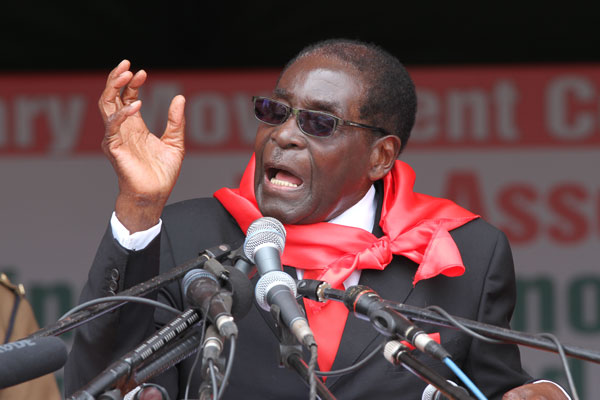
PRESIDENT Robert Mugabe does not hide his disdain for gays and lesbians and is on record describing homosexuals as “worse that pigs and dogs” and homosexuality as a “white problem”.
BY RICHARD CHIDZA
The emotive issue of gays and lesbians, which is frowned at by those rooted in traditions had always been a “hush-hush” matter in the corridors of power, until Mugabe opened the lid with a vitriolic attack on them at the opening ceremony of the Zimbabwe International Book Fair (ZIBF) in 1995.
Mugabe’s government directed the banning of the Gays and Lesbians Association of Zimbabwe (Galz) from the fair and this, coming from a Head of State, sent shivers down the spines of the group’s membership.
“We do not believe that they [gays and lesbians] have any rights at all,” Mugabe said then.
Mugabe’s 1995 attack on Galz precipitated a downward spiral of the fortunes of the ZIBF, leading to the resignation of four of the 18 trustees, and high-level protests from human rights organisations, foreign governments and well-known African authors and governments which funded the fair.
Now, with less than three months before the opening of the International Conference on Aids and STIs in Africa (Icasa) conference set for December, Mugabe will once again be in the spotlight.
A growing number of governments on the continent and beyond have since categorised gays and lesbians as a “key population” to attend the event along with sex workers and intravenous drug users.
- Chamisa under fire over US$120K donation
- Mavhunga puts DeMbare into Chibuku quarterfinals
- Pension funds bet on Cabora Bassa oilfields
- Councils defy govt fire tender directive
Keep Reading
Health and Child Care minister David Parirenyatwa, under pressure from international partners to state the country’s position, buckled under and issued a statement guaranteeing the rights of “key populations”, including gays and lesbians.
“Zimbabwe is committed to achieving the Global Fast Track Targets set by UNAids. Zimbabwe has identified populations that are key to the epidemic to inform the national programming and acknowledge the diversity of key populations as defined by other countries in line with global standards,” Parirenyatwa said in a statement.
“As the vice-president of the Icasa 2015, I commit to take necessary steps to ensure a fully inclusive planning process. The committee will work with all relevant ministries, civic society, affected communities and partners to ensure that the Icasa represents the diversity that exists in the diverse response globally.”
Parirenyatwa added; “We assure our partners that the planning committee is working on various issues that go with handling an event of this magnitude. We are one to learn from experiences elsewhere and to incorporate continental best practices in our planning so that the integrity of the Icasa is fully upheld.”
Zimbabwe Doctors for Human Rights’ chairperson Rutendo Bonde said the rights of all people to health should be respected.
“The constitution of the country is unambiguous regarding these rights and the need to make sure all citizens enjoy them despite their sexual orientation. Key populations such as intravenous drug users, sex workers and of course gays and lesbians, are at increasing vulnerability of acquiring HIV.
“Every small step towards bridging the gap should be looked at in a positive light. From a public health perspective, we are moving in the right direction. The legal and political environment will remain so but the public health environment has moved forward. There are more doors to be opened and Zimbabwe is well-known for best practices. That is our aim; we are trying to find a way to make things work,” Bonde said.
Senior officials within government and in particular the National Aids Council (NAC) indicated that there seems to have been a climb-down within government following a realisation that “alienating these key populations would work against government efforts to reduce the prevalence of HIV and Aids”.
“Despite the clear provisions of the law, there are programmes and projects being run by government agencies promoting the health of gays and lesbians,” she said.
However, NAC operations director Raymond Yekeye said Zimbabwe was yet to designate gays and lesbians as “key populations”.
“NAC coordinates programmes that are being implemented by government departments, as well as non-governmental organisations and other partners. We do not implement any project or programme,” he said.
“Most of the programmes we have now are targeted at sex workers and young girls and we have partner implementers. You may be aware that we look at where new infections are coming from and those are the areas we target.”
SafAIDS country training, advocacy and programmes co-ordinator, Adolf Mavheneke told a workshop in Masvingo this week that stigmatisation affected key populations like gays and lesbians.
“Social prejudice, intolerance and lack of understanding of gender diversity was at the centre of HIV and TB-related stigma and discrimination and consequent denial of health services among key populations like lesbians, gays, bisexual, transgender and intersexed (LGBTI) and sex workers,” Mavheneke said.
Mugabe and his administration have for years been criticised for clamping down on gays and lesbians. However, during Icasa they will find themselves in a tricky situation.











